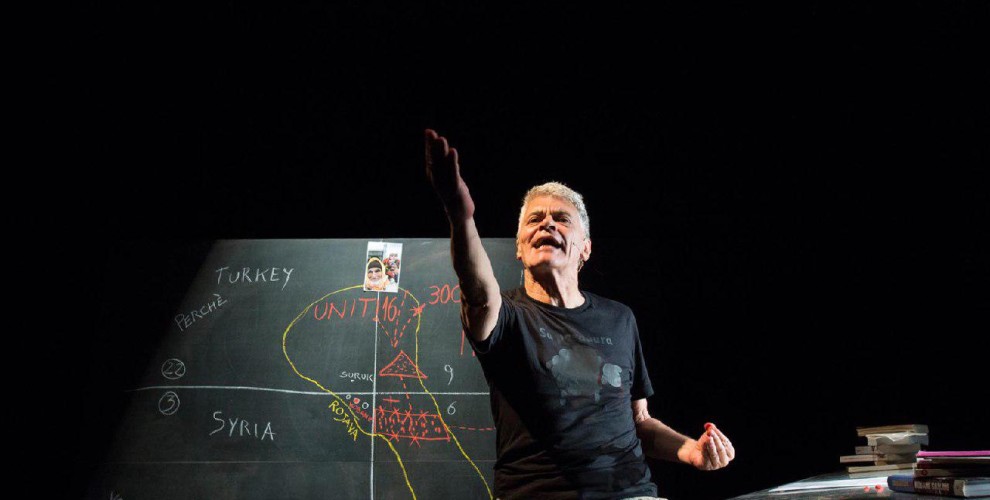'The country that is not', putting Kurds at the centre of stage
The play premiered at Naples Theater Festival
The play premiered at Naples Theater Festival

Standing ovation and enthusiasm: thus has been received the theatre piece “The country that is not - Journey through the mountains people’.
Written, directed and interpreted by Fabrizio Saccomanno and Gianluigi Gherzi, the piece starts from a migrants landing on a rock of Salento to arrive to Kurdistan, the state impossible to find. A journey to discover that between worlds that seem so far from each other there is only the sea.
The two directors and actors spoke to ANF about the play, Kurds, and how Kurdistan and the Democratic Confederalism is closer than we think.
How did you get in touch with Kurds?
The Kurds at the beginning were a mysterious object. Difficult to understand who they were, even where they were. Then it happens that a friend tells you about them. And another person tells you a story, which is that of the village of Maxmur. Then you start reading a book, and from that moment you simply can’t stop.
Because you did not know, you could not imagine. You did not know about the violence of the repression against the Kurdish people, but above all you could not imagine that within that violence, that permanent state of war, a new and different thought and mindset could flourish, unheard of for our categories and visions of the world.
That’s the point when you know that the history of Kurds today is a decisive story for all of us.
What motivated you to put it on stage?
Certainly a sense of need to communicate, to let people know, to show. But also the desire to put the story, and in particular the history of the Kurds, back at the center of the attention of the spectators.
The desire to break the separation between art and life, between art and history. And the desire to turn the present, this present of the Kurds, into an extraordinary subject for a theatrical story, a very human and epic story at the same time, a challenge and a bet contemporary theatre could not miss.
The sea between different stories ... What is the meaning of the Mediterranean, especially today.
In our show the sea, the Mediterranean, is that border denied to those who escape from wars, to those who dream of future, to those who move out of necessity and for the necessary curiosity of what the world is.
In our show on the sea, on our sea of Salento, rafts are crashing. In the shipwreck we tell about, on board some of those boats, there are Kurds. They were saying they came from Turkey, they said they came from a civil war, but at the time, and perhaps still today, nobody understands them. That tragedy is always canceled, always hidden.
How do you work to create the play?
Above all, we worked on a question: what does Kurdistan really have to do with us?
How does that story speak to us, what are the right stories, but above all which is the right way to tell. How to avoid the traps of rhetoric and self-reference, to draw instead a story where every viewer can recognise his/her deep roots, his/her own threatened humanity, his/her own dream and his/her own utopia of not wanting to surrender to the world as it is.
Books have infinitely helped us, meetings with Kurds living in Italy, the relationship with Uiki, the Information Office on Kurdistan in Italy, which we jokingly call our "clandestine consulate".
And finally it was a great reference point for us the presence of Giovanni Giacopuzzi, his infinite passion and ability to fill every day with news, reflections, unusual points of view on what is the Kurdistan.
A small, supportive and passionate community has moved around the construction of the play, which has supported us in the preparation and accompanied until the debut that took place in the largest Italian Theater Festival, the Napoli Teatro Festival, with enormous success. The creation of our show was also a community story, or in other words, a very Kurdish story.